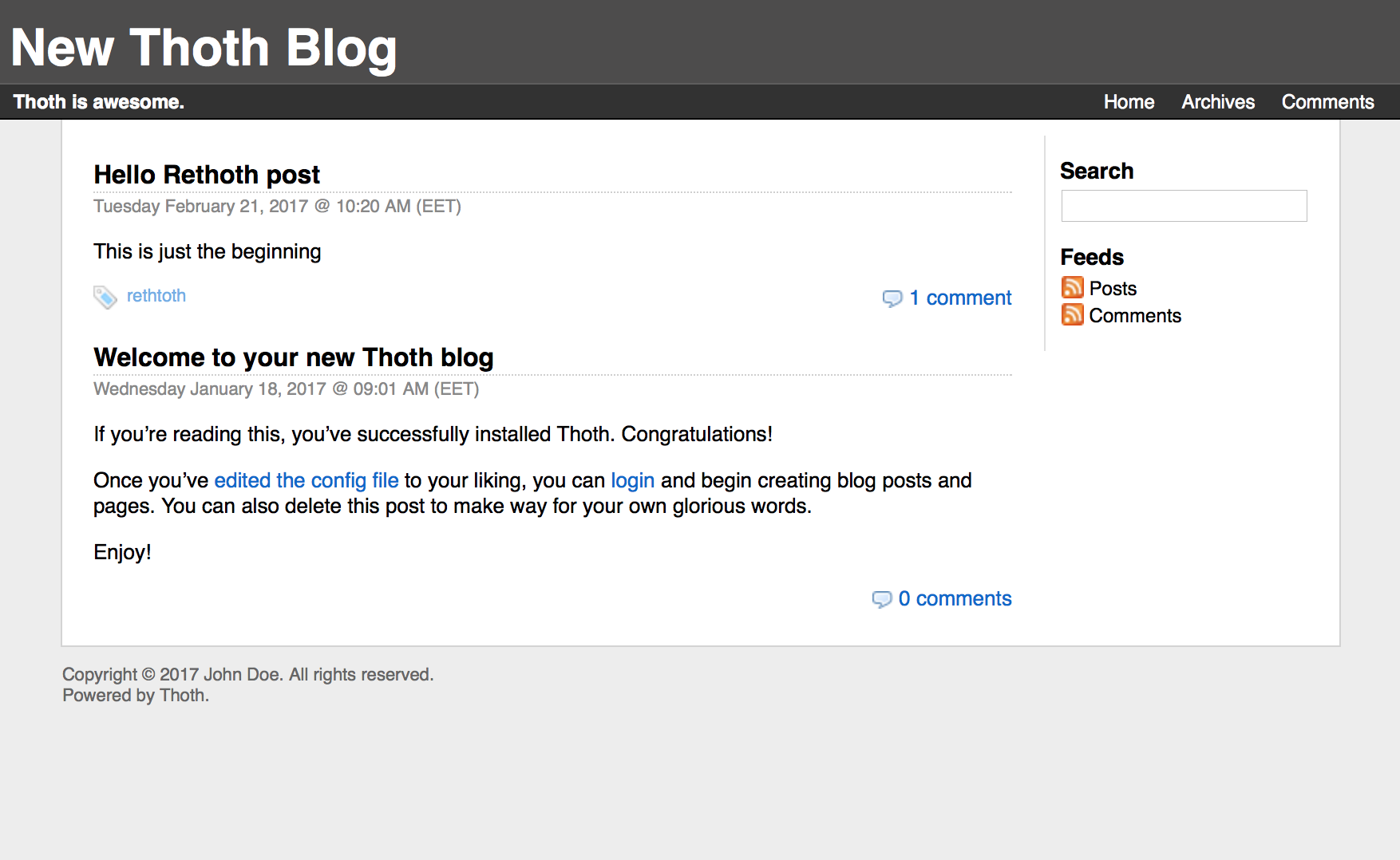Rethoth 0.4.2 (2017)
Rehoth is a simple to understand, run and maintain Ruby blogging engine
Rethoth (previously known as Thoth) is written in Ruby and is based on the Ramaze web framework and the Sequel database toolkit. Rethoth 0.4.x is a modern port, to 2017, of the original Thoth created by @ryangrove.
Try Rethoth now!
For a quick start using SQLite3 as a database:
gem install rethoth
gem install sqlite3
thoth --create test_project
cd test_project
thoth --migrate
thoth
Then, point your browser to http://localhost:7000/admin and use 'thoth' as your username and password.
If you want to run or migrate in development mode use the --devel switch
e.g.,
thoth --devel --migrate
thoth --devel
Note that the name of the executable is still thoth.
Why Rethoth?
Simple
The purpose of Rethoth is to be a simple to understand, run and maintain blogging engine
See the Wiki
Fully featured
Rethoth has the features you need to run a blog without the hassle:

- Textile format support.
- Pages and blog post URL names can be specified by the author.
- You can upload files and link to them from sensible URLs.
- Post and pages can be previewed.
- Posts and pages can be saved as draft.
- Page and post names are automatically validated for uniqueness.
- Tags are supported.
- Tags are suggested as you type when creating or editing a blog post.
- Tag statistics are supported.
- Blog posts provide Atom feeds for recent comments.
- Tag pages provide Atom feeds for posts with that tag.
- Comments can be enabled/disabled per post.
- New comments require an email address.
- Deleted comments remain in the database but are hidden from view
- Comments are sanitised for safe HTML.
- Multiple comments may be deleted at once.
- Gravatar support.
- Flickr plugin.
- Delicious plugin.
- Memcache support.
- Minification of CSS and JS files.
- All admin forms validate a session-specific form token on submission to prevent cross-site request forgery attacks.
- Auto-generates an XML sitemap at http://yourblog.com/sitemap.
Educational
Rethoth demonstrates how to easily build a useful MVC-style app in Ruby without having to deal directly with meta-programming and DSL magic.
No Rails needed
Rethoth is an example of how to build a web application in Ruby without the need to learn Rails and ActiveRecord.
Feels very familiar to non-Rubyists
Rethoth is also ideal for newcomers to Ruby who have experience with other web frameworks and want to quickly appreciate the language and become productive with it.
Installation
gem install rethoth
Rethoth depends on:
- Ruby >= 2.3.0
- Ramaze 2012.12.08
- Innate 2015.10.28
- Sequel >=4.42.0
- Rake 12.0.0
You will also have to install a database driver such as sqlite3 or mysql2. e.g.,
gem install sqlite3
Rethoth for developers
Building the gem
rake install
Customizing Rethoth
See the Wiki pages
API Reference
TBD
Tests
TBD
Describe and show how to run the tests with code examples.
Contributors
Thoth was resurrected, updated and brought to 2017 by John Pagonis (@pagojo). It was originally developed between 2008 and 2012 by Ryan Grove (@rgrove). Thank you Ryan! Steven Bedrick (@stevenbedrick) has also contributed.
We had to rename the project to Rethoth due to project name clashes on the Rubygems site.
History
This file was created by John Pagonis (@pagojo).
You can read more about Thoth's 2008--2012 history here.
License
Rethoth uses the 'BSD 3 Clause' licence.
Rethoth uses icons from the gorgeous Silk icon set by famfamfam, which is licensed under the Creative Commons Attribution 2.5 license.